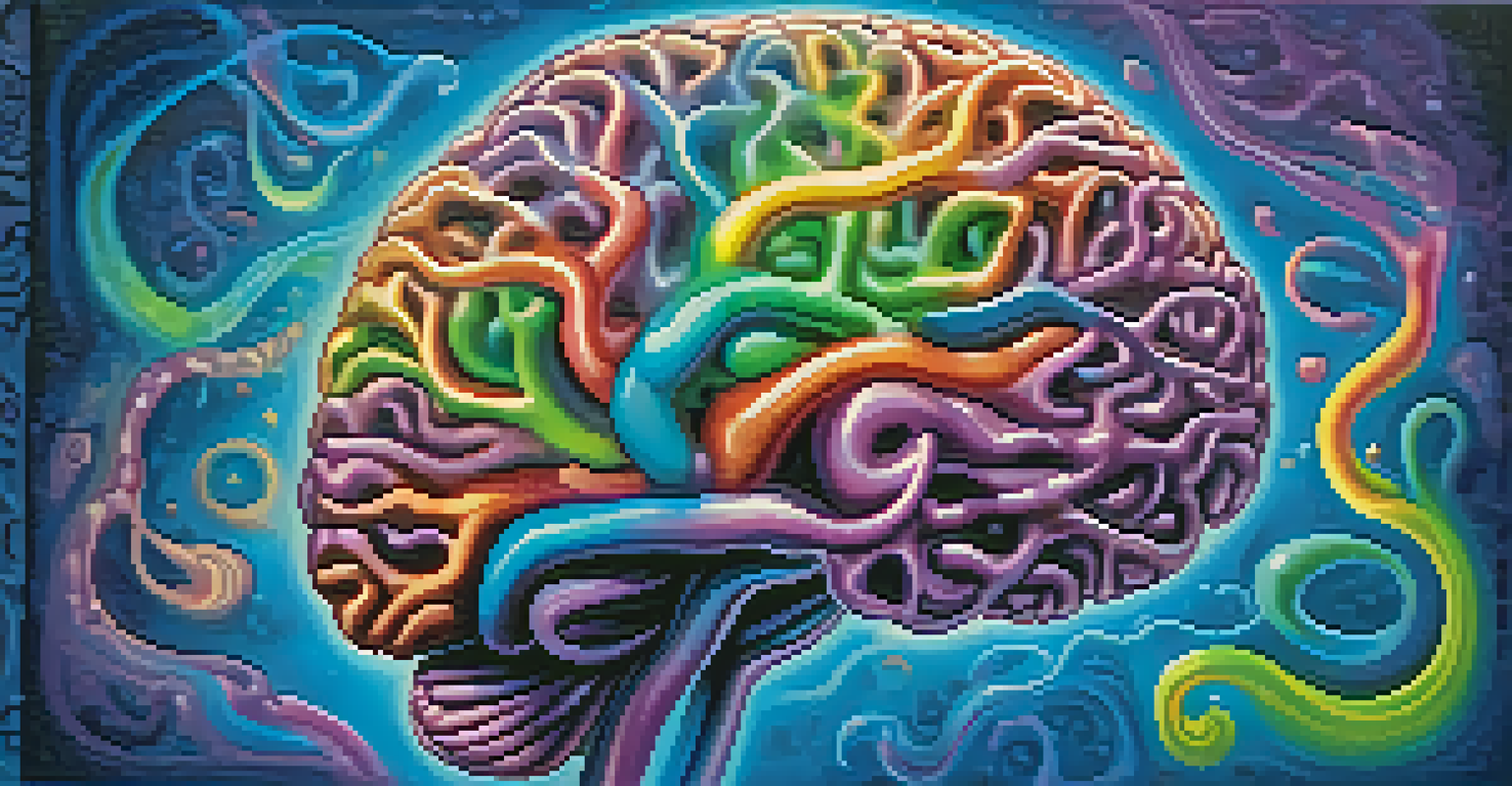Mescaline's Neurochemical Impact on Mental Health Disorders

What is Mescaline and Its Historical Context?
Mescaline is a naturally occurring psychedelic compound found in several cacti, including the peyote cactus. Historically, it has been used in Indigenous cultures for spiritual and healing purposes, often in ceremonial contexts. This rich background highlights its significance beyond just a recreational substance, inviting a deeper exploration of its effects on the mind.
The use of psychedelics is not only about the experience itself; it's about understanding the mind and the potential for healing it can bring.
In recent years, there's been a resurgence of interest in psychedelics, particularly their potential therapeutic applications. Researchers are looking into how mescaline and other psychedelics can aid in treating mental health disorders, such as depression and anxiety. This shift in perception raises important questions about how these substances might be used responsibly in modern medicine.
Understanding mescaline's history not only contextualizes its use but also underscores the importance of cultural respect and ethical considerations in modern research. As we delve into its neurochemical impact, it’s essential to remember the traditional wisdom that has existed for centuries.
Neurochemical Mechanisms of Mescaline
Mescaline primarily affects the brain by interacting with serotonin receptors, particularly the 5-HT2A receptor. This interaction can lead to altered perceptions, mood changes, and a sense of connectedness. By mimicking the structure of serotonin, mescaline creates a unique neurochemical environment that facilitates profound psychological experiences.

The modulation of serotonin plays a crucial role in regulating mood and anxiety, which is why researchers are keen on studying mescaline's effects on mental health disorders. A deeper understanding of these mechanisms may unlock new pathways for treatment. This is particularly significant for conditions like depression, where serotonin levels are often imbalanced.
Mescaline's Historical Importance
Mescaline has a rich history of use in Indigenous cultures for spiritual and healing purposes, emphasizing the need for cultural respect in modern research.
Moreover, the neurochemical changes induced by mescaline can lead to enhanced emotional processing and introspection. This can provide individuals with insights into their mental health challenges, potentially fostering healing and personal growth.
Potential Benefits for Anxiety and Depression
Research indicates that mescaline may offer therapeutic benefits for individuals struggling with anxiety and depression. Users often report experiencing a shift in perspective, which can help them confront their issues more effectively. This ability to view problems from a different angle can be transformative and lead to lasting change.
Psychedelics are a unique tool that can facilitate a greater understanding of our mental health and the complexities within.
In clinical settings, psychedelics like mescaline are being studied for their potential to facilitate emotional breakthroughs. The experiences can encourage individuals to address underlying traumas and fears that contribute to their mental health disorders. This therapeutic journey might not only alleviate symptoms but also promote long-term healing.
While the potential is promising, it’s important to approach mescaline therapy carefully, under professional guidance. The experiences can be intense and unpredictable, highlighting the need for a safe environment and proper support systems.
Challenges and Risks Associated with Mescaline
Despite its potential benefits, mescaline is not without risks. Some individuals may experience adverse reactions, such as anxiety or paranoia, especially if taken in uncontrolled settings. These reactions can overshadow the therapeutic effects, making it crucial to consider the mental state of the user before administration.
Additionally, the legality of mescaline varies by region, which can complicate access to research and therapy. Navigating these legal landscapes requires careful consideration and advocacy for responsible use. Understanding the legal context is essential for those interested in exploring mescaline’s therapeutic potential.
Therapeutic Potential for Mental Health
Research shows that mescaline may help alleviate symptoms of anxiety and depression by facilitating emotional breakthroughs and offering new perspectives.
Ultimately, the risks associated with mescaline highlight the importance of responsible use and the need for further research. Balancing the potential benefits with these risks is crucial for developing effective treatment protocols.
Current Research Trends on Mescaline
As interest in psychedelics grows, so does research into mescaline’s effects on mental health. Studies are examining its impact on conditions like PTSD, addiction, and depression. This research aims to understand how mescaline can be integrated into therapeutic practices effectively.
Current studies often focus on the safety and efficacy of mescaline in controlled settings. For instance, researchers are exploring how guided sessions can enhance the therapeutic experience. This approach emphasizes the importance of preparation and integration after the experience, ensuring lasting benefits.
Moreover, as findings emerge, there’s a growing call for public and medical education on psychedelics. Raising awareness about the potential of substances like mescaline can foster informed discussions and pave the way for more inclusive mental health treatments.
Integration of Mescaline into Holistic Treatment Plans
Integrating mescaline into holistic treatment plans can enhance traditional therapeutic approaches. This may involve combining mescaline-assisted therapy with cognitive-behavioral techniques or mindfulness practices. Such integration could provide a more comprehensive approach to mental health care.
Holistic treatment recognizes that mental health is influenced by various factors, including emotional, physical, and spiritual well-being. By incorporating mescaline, therapists can offer clients a deeper exploration of their psyche, fostering greater self-awareness. This approach can lead to more personalized treatment strategies.
Importance of Responsible Use
Despite its potential benefits, mescaline carries risks that necessitate careful administration and a safe environment to ensure positive therapeutic outcomes.
However, successful integration requires collaboration between mental health professionals and researchers. Establishing guidelines for safe and effective use is essential for maximizing the potential benefits of mescaline in therapeutic settings.
Future Directions in Mescaline Research
The future of mescaline research looks promising, with ongoing studies aimed at uncovering its full potential. Researchers are delving into various aspects, including dosage, administration methods, and long-term effects. These inquiries are crucial for establishing best practices in therapeutic settings.
Additionally, as societal attitudes toward psychedelics shift, there may be increased funding and support for mescaline research. This could lead to more comprehensive studies that explore its impact on diverse populations and various mental health disorders. The potential for breakthroughs in treatment is vast.

Ultimately, the future of mescaline research hinges on collaboration between scientists, clinicians, and policymakers. By working together, we can ensure that mescaline is used responsibly and effectively in the pursuit of improved mental health outcomes.